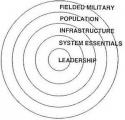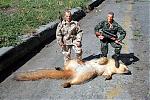This is becoming a conversation I have with my tactics students regularly.
Out of FM 1-02, Operational Terms and Graphics (All definitions are US Army definitions, as opposed to NATO or DoD):
Holding and Clearing are two different tactical tasks and missions. By themselves (by doctrine) you're not going to accomplish what you mentioned above in tasking units with clearing and holding. However...Clear - A tactical mission task that requires the commander to remove all enemy forces and eliminate organized resistance in an assigned area.
Hold - To maintain or retain possession by force, as a position or an area.
Suffice it to say, with technology are you ever going to truely isolate an insurgent in a free society? Probably not without infringing pretty heavily on the rights of the populace. What else is there?Isolate – A tactical mission task that requires a unit to seal off—both physically and psychologically—an enemy from his sources of support, deny an enemy freedom of movement, and prevent an enemy unit from having contact with other enemy forces.
So here's the question. Out of the above options, which is the most feasible and which is least? Why? Additionally, what is the purpose of the task? Even better (looking for the prospective planners out there) put it into task, purpose, method, effect format. You might win a chance to serve on a Corps staff if your answer is good enough.Control - A tactical mission task that requires the commander to maintain physical influence over a specified area to prevent its use by an enemy.
Contain – To stop, hold, or surround the forces of the enemy or to cause the
enemy to center activity on a given front and to prevent the withdrawal of any part of the enemy’s force for use elsewhere.
Occupy – A tactical mission task that involves a force moving into an area so that it can control the entire area. Both the force’s movement to and occupation of the area occur without enemy opposition.
Seize – A tactical mission task that involves taking possession of a designated area using overwhelming force.
Secure - A tactical mission task that involves preventing a unit, facility, or geographical location from being damaged or destroyed as a result of enemy action.






 ) I've been browsing and only jumped in when I thought I could answer a question. Then I got asked a question.
) I've been browsing and only jumped in when I thought I could answer a question. Then I got asked a question. 


 - Many are addressed in depth in some of the different forums on the site. The reason I bring it up is that the people who start a thread and may be the SME (subject matter expert) on a question, might be monitoring those topics more closely - so you might get an answer faster, or a more complete one.
- Many are addressed in depth in some of the different forums on the site. The reason I bring it up is that the people who start a thread and may be the SME (subject matter expert) on a question, might be monitoring those topics more closely - so you might get an answer faster, or a more complete one. 

Bookmarks